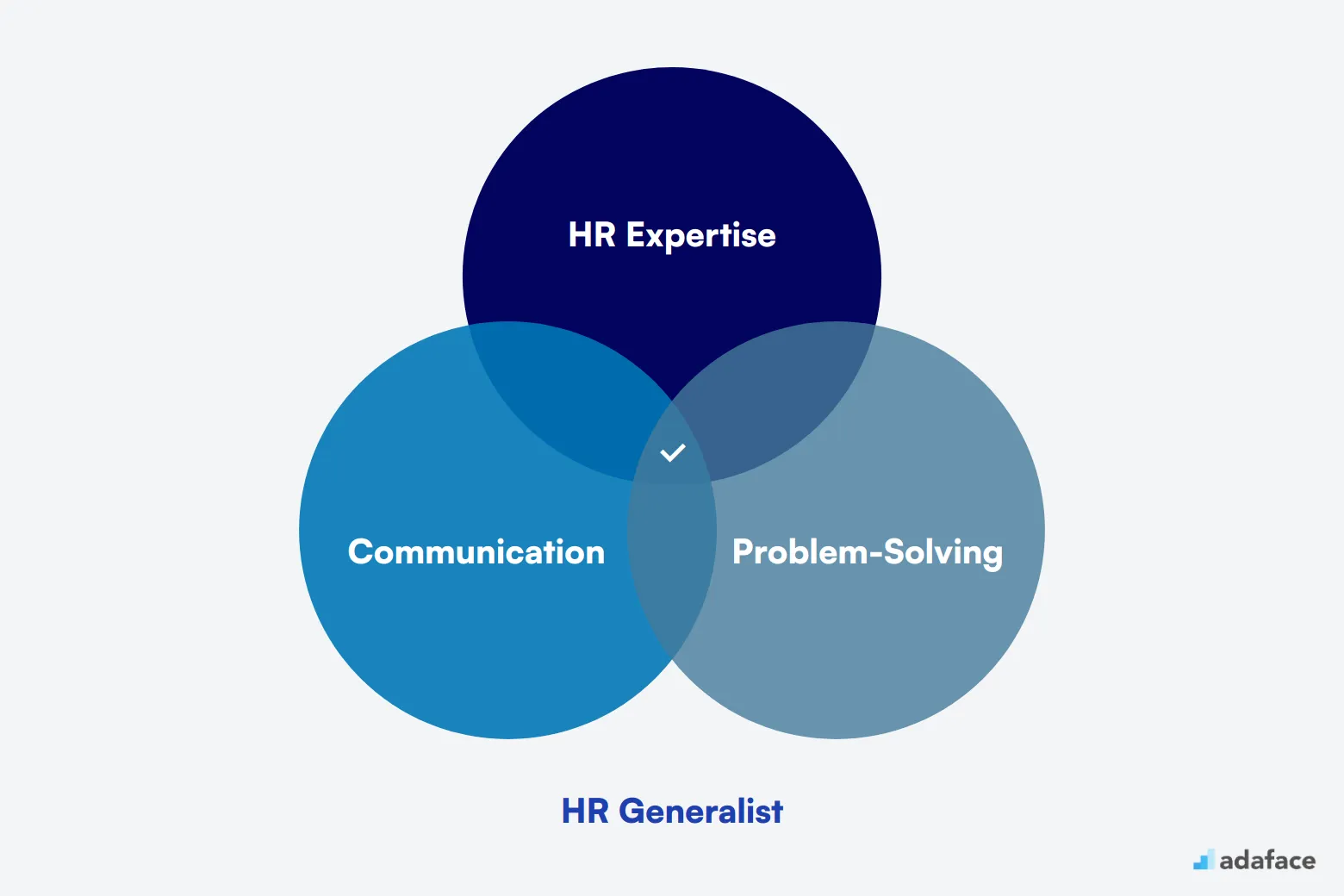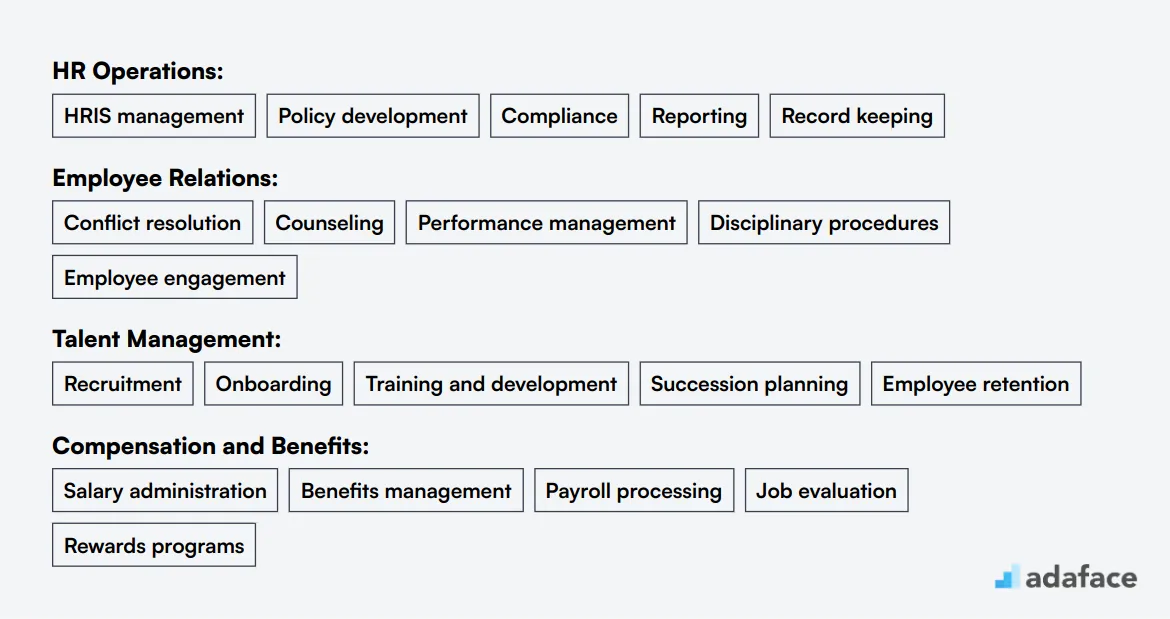Hiring an HR Generalist is a crucial decision for companies that want to efficiently manage their human resources operations. As a recruiter or hiring manager, understanding the nuances of this role is key to a successful hire. An HR Generalist is expected to handle a wide range of HR functions, from recruitment to compliance, so finding a candidate with a versatile skill set is important. Often, hiring managers miss the mark by not focusing on the necessary qualifications or by not clearly defining the role's responsibilities.
In this article, we look at why hiring an HR Generalist matters, the skills and qualifications to prioritize, and the platforms where you can find the best candidates. We also provide tips for crafting an effective job description and discuss the differences between an HR Generalist and an HR Business Partner. For more on necessary skills, you can check out our detailed guide here.
Table of contents
Why Hire an HR Generalist?
An HR Generalist can be a valuable addition to your team when you're facing challenges in managing employee relations, recruitment, or compliance. For instance, if you're struggling with high turnover rates or inefficient onboarding processes, an HR Generalist can help streamline these areas.
Consider hiring an HR Generalist when:
- Your company is growing rapidly and needs structured HR processes
- You're spending too much time on HR tasks instead of core business activities
- You need help with employee engagement and retention strategies
If you're unsure about committing to a full-time HR Generalist, start by bringing in a consultant for a short-term project. This can help you assess your HR needs and determine if a permanent hire is necessary.

Skills and qualifications to look for in a HR Generalist
Creating an ideal candidate profile for an HR Generalist can be tricky. The role often varies across companies, with some skills being must-haves for one organization but just preferences for another. To help you get started, we've compiled a list of popular required and preferred skills for this position.
When evaluating candidates, focus on their core HR expertise and adaptability. Look for individuals who can handle a wide range of responsibilities, from employee relations to HR operations. Remember to distinguish between essential qualifications and nice-to-have attributes to ensure you don't miss out on promising talent.
| Required skills and qualifications | Preferred skills and qualifications |
|---|---|
| Bachelor's degree in Human Resources or related field | PHR or SHRM-CP certification |
| 2+ years of experience in HR generalist roles | Experience with employee relations and conflict resolution |
| Knowledge of labor laws and HR best practices | Familiarity with talent acquisition and onboarding processes |
| Proficiency in HRIS and Microsoft Office Suite | Knowledge of performance management systems |
| Strong communication and interpersonal skills | Experience with benefits administration |
How to Write an Effective HR Generalist Job Description
Once you have a candidate profile ready, the next step is to capture that information in the job description to attract the right candidates. A well-crafted HR Generalist job description is key to appealing to suitable applicants.
- Highlight key responsibilities: Clearly outline the HR Generalist's main duties, such as managing employee relations, administering benefits, and ensuring compliance with labor laws. This helps candidates understand the scope and impact of their role within your organization. For more details, refer to the HR Generalist job description.
- Balance technical skills with soft skills: While listing necessary qualifications like knowledge of HRIS and understanding of labor legislation, don't forget to emphasize soft skills like communication, conflict resolution, and adaptability. This balance will attract candidates who are technically adept and well-rounded.
- Showcase unique selling points: Highlight what sets your company apart, such as a supportive work culture, opportunities for growth, or unique benefits. These aspects can differentiate your job post from others and draw interest from top talent.
10 platforms to hire HR Generalists
Now that you have your job description ready, the next step is to list it on various job platforms to attract potential candidates. This process is crucial to finding the right HR Generalist who can meet your organization's specific needs. Below, we explore the top three platforms to kickstart your hiring process.
The remaining platforms include Upwork for freelance opportunities, FlexJobs and We Work Remotely for remote candidates. Monster Hiring Solutions and ZipRecruiter are great for reaching a broad audience for full-time roles. CareerBuilder provides a comprehensive tool for accessing vast resume databases, while AngelList caters to startups. Each platform offers unique features that can help you source and evaluate candidates effectively. For additional tips on the hiring process, consider utilizing skills assessment tools to streamline candidate evaluation.
Keywords to Look for in HR Generalist Resumes
Resume screening is a time-saver for HR Generalist hiring. It helps you quickly identify candidates who match your job requirements before moving to interviews.

For manual screening, focus on key HR skills and qualifications. Look for terms like 'HRIS management', 'employee relations', 'talent acquisition', and 'benefits administration'. Also, check for relevant certifications like PHR or SHRM-CP.
AI tools can speed up resume screening. You can use AI-powered skills assessment tools or language models like ChatGPT. Just provide the AI with your job requirements and let it analyze resumes for you.
Here's a sample prompt for AI resume screening:
TASK: Screen resumes for HR Generalist role
INPUT: Resumes
OUTPUT:
- Candidate Name
- Matching keywords
- Score (out of 10)
- Recommendation
- Shortlist (Yes/No/Maybe)
KEYWORDS:
- HR Operations (HRIS, policy development, compliance)
- Employee Relations (conflict resolution, performance management)
- Talent Management (recruitment, onboarding, training)
- Compensation and Benefits
- [Communication skills](https://www.adaface.com/assessment-test/communication-test)
- Problem-solving
Recommended Skills Tests to Screen HR Generalists
After resume screening, assessing the specific skills of HR Generalists is crucial to ensure they can handle various responsibilities effectively. Skills tests provide a reliable way to evaluate candidates' capabilities beyond what their resumes and interviews may reveal. Below are our recommendations for skills tests to consider:
HR Test: This test evaluates candidates on critical HR functions such as employee relations, performance management, and compliance. It's recommended to ensure the candidate has a solid understanding of HR processes.
Communication Test: Effective communication is key for HR Generalists. This test assesses verbal and written communication skills, helping you identify candidates who can convey information clearly and manage conflicts.
Situational Judgement Test: This test gauges how candidates approach complex HR scenarios. It helps identify those with good decision-making skills and the ability to handle unexpected situations appropriately.
Attention to Detail Test: HR Generalists need to be detail-oriented, especially when dealing with documentation and compliance. This test identifies candidates with the carefulness needed for accuracy in HR tasks.
Cognitive Ability Test: To assess problem-solving and critical thinking, this test is ideal. It provides insight into a candidate's aptitude for understanding and navigating multifaceted HR challenges.
What's the difference between an HR Generalist and an HR Business Partner?
While the roles of HR Generalist and HR Business Partner often seem similar, they serve different purposes within an organization. Many people confuse the two because both involve people management and organizational development, but their focus and responsibilities vary significantly.
An HR Generalist typically handles broad HR functions, focusing on day-to-day operations across various HR areas. This role is usually at the entry to mid-level and interacts primarily with employees, requiring about 2-5 years of experience. Key skills for this position include HR policies, administration, and compliance.
In contrast, an HR Business Partner takes on a strategic role, aligning HR practices with business objectives. Operating at a mid to senior-level, this position involves significant interaction with executives and department heads, along with advanced business acumen and decision-making authority. Typically, HR Business Partners have 5-10+ years of experience and focus on strategic planning, change management, and consulting.
| HR Generalist | HR Business Partner | |
|---|---|---|
| Scope of Role | Broad HR functions | Strategic business alignment |
| Organizational Level | Entry to mid-level | Mid to senior-level |
| Primary Focus | Day-to-day HR operations | Long-term HR strategy |
| Stakeholder Interaction | Mostly employees | Executives and department heads |
| Decision-Making Authority | Limited | Significant |
| Business Acumen Required | Basic | Advanced |
| Typical Experience | 2-5 years | 5-10+ years |
| Key Skills | HR policies, administration, compliance | Strategic planning, change management, consulting |
Hire the Right HR Generalists for Your Needs
Throughout this blog post, we have explored the significance of hiring an HR Generalist, the essential skills and qualifications to look for, how to craft an effective job description, and the recommended platforms and methods for screening candidates. These insights are designed to guide recruiters and hiring managers in making informed decisions when adding an HR Generalist to their team.
If there's one key takeaway, it's the importance of utilizing well-crafted job descriptions and appropriate skills tests to enhance the accuracy of your hiring process. Tools such as the HR test can help assess candidates' suitability, ensuring you find the right fit for your organization.
HR Test
FAQs
An HR Generalist typically handles tasks such as recruitment, performance management, employee relations, compliance, and benefits administration.
Look for strong communication, organizational, and multitasking skills, as well as a good understanding of HR software and labor laws.
Specify the responsibilities, required skills, and qualifications. Be clear about the expectations and what makes your company unique.
Consider using online job platforms, such as LinkedIn, Indeed, and specialized HR job boards.
An HR Generalist covers a broad range of HR tasks, while an HR Business Partner focuses on aligning HR strategies with business goals.
Understanding these differences helps in hiring the right person for the specific needs of your company, ensuring efficient human resource management.
Skills tests like cognitive ability and situational judgment tests can be useful in screening HR Generalists.

40 min skill tests.
No trick questions.
Accurate shortlisting.
We make it easy for you to find the best candidates in your pipeline with a 40 min skills test.
Try for freeRelated posts
Free resources



